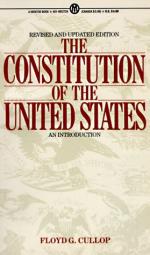
|
| Name: _________________________ | Period: ___________________ |
This test consists of 15 multiple choice questions and 5 short answer questions.
Multiple Choice Questions
1. According to Amendment 19 (1920), the right of citizens to the U.S. to vote cannot be taken away or restricted because of a person's what?
(a) Age.
(b) Sex.
(c) Prior citizenship.
(d) Religion.
2. Which freedom is included in Amendment 1?
(a) No citizen may advocate overthrowing the government.
(b) No citizen may advocate overthrowing the government by war.
(c) Freedom from unlawful search, seizure.
(d) Right to bear arms.
3. Amendment 14, Section 1 (1868) stipulates anyone born in the U.S. and governed by it is what type of citizen?
(a) U.S. and state in which he resides.
(b) Naturalized.
(c) U.S. and country where he was born.
(d) U.S. and state in which he was born.
4. What is an assembly?
(a) An appearance in court.
(b) To appear similar to someone or something else.
(c) An amount of money put up to ensure appearance at trial.
(d) A gathering of people.
5. To supply room and board means to what?
(a) Inquiry.
(b) Quartet.
(c) Quarter.
(d) Quarry.
6. One of the amendments included in the Bill of Rights is the freedom from unusually high what?
(a) Fees.
(b) Taxes.
(c) Bail.
(d) There is no such freedom.
7. Being tried again for a crime already found not guilty of is the definition of what?
(a) Jeopardy.
(b) Double indemnity.
(c) Double jeopardy.
(d) Indemnity.
8. Listing by number best defines which of the following terms?
(a) Enucleation.
(b) Emancipation.
(c) Enumeration.
(d) Enunciation.
9. Under Amendment 14, Section 5 (1868) Congress was given the power to enforce this amendment in what manner?
(a) Judicial decree.
(b) Appropriate legislation.
(c) Congressional decree.
(d) Executive order.
10. Amendment 22 (1951) declares that a President may not serve more than two terms, but did not apply to which President who was in office when it was proposed?
(a) Dwight D. Eisenhower.
(b) Harry S. Truman.
(c) Herbert Hoover.
(d) Franklin D. Roosevelt.
11. What is the term for a sum of money put up by arrested individuals to ensure their return, so they may be released until the time of their trial?
(a) Bale.
(b) Bail.
(c) Braille.
(d) Bile.
12. To accuse and attempt to prove guilty means what?
(a) Execute.
(b) Prosecute.
(c) Proselyte.
(d) Prostrate.
13. Amendment 14, Section 1 (1868) stipulates no state may deny any person, under its government, what?
(a) Right to be read "Miranda Warning" upon arrest.
(b) Equal wages for equal labor.
(c) Equal protection of the law.
(d) Right to be read "Miranda Warning" prior to questioning.
14. Common law refers to which term?
(a) Military law.
(b) Civil law.
(c) Criminal law.
(d) Religious affairs.
15. Amendment 1 contains how many freedoms?
(a) 5.
(b) 3.
(c) 10.
(d) 12.
Short Answer Questions
1. The warrant for a search requires what written in it?
2. What is another freedom in Amendment 1?
3. Amendment 14, Section 2 (1868) stipulates that representatives to Congress be elected in each state according to what?
4. Congress was given the power to do away with Section 3 of Amendment 14, concerning certain supporters of the Confederacy, by a 2/3 vote, and did so in what year?
5. Which freedom can be found in Amendment 1?
|
This section contains 551 words (approx. 2 pages at 300 words per page) |

|




